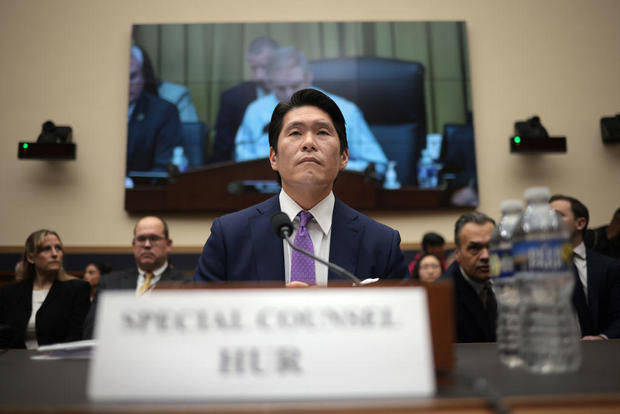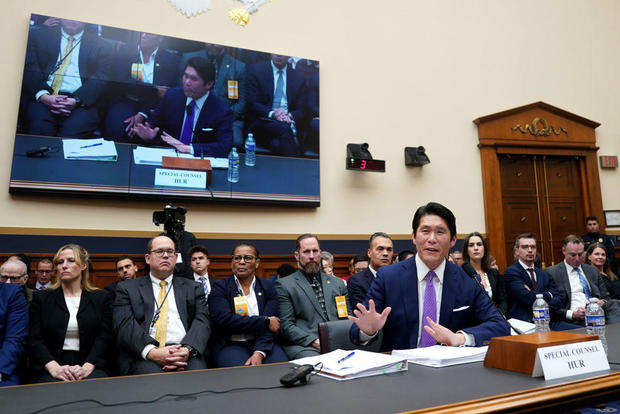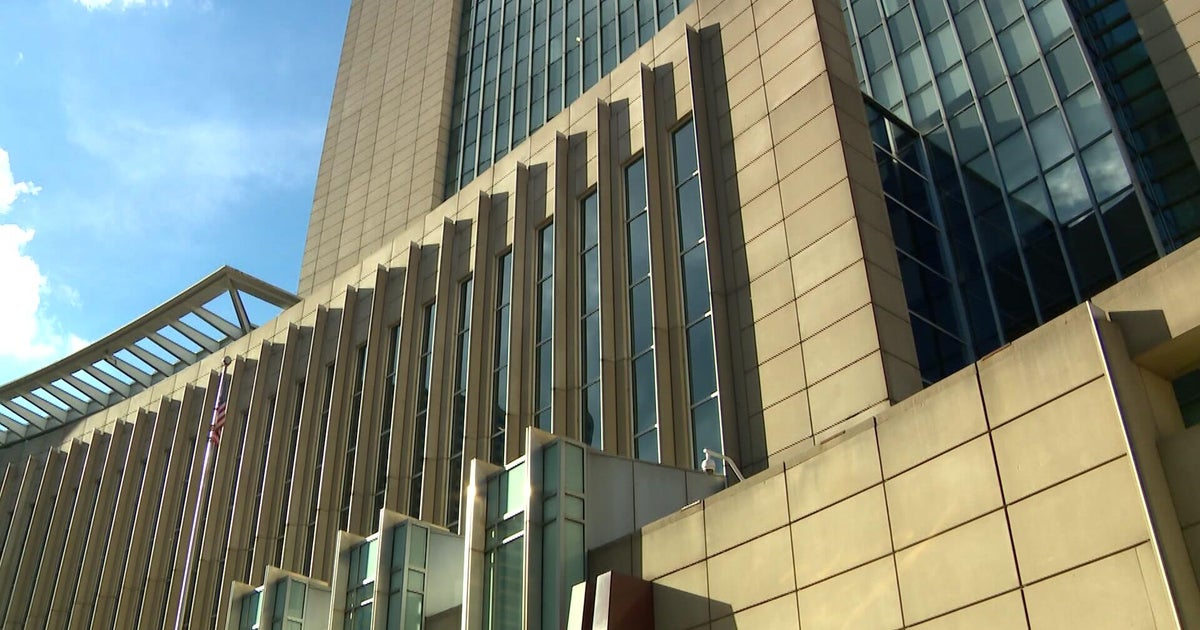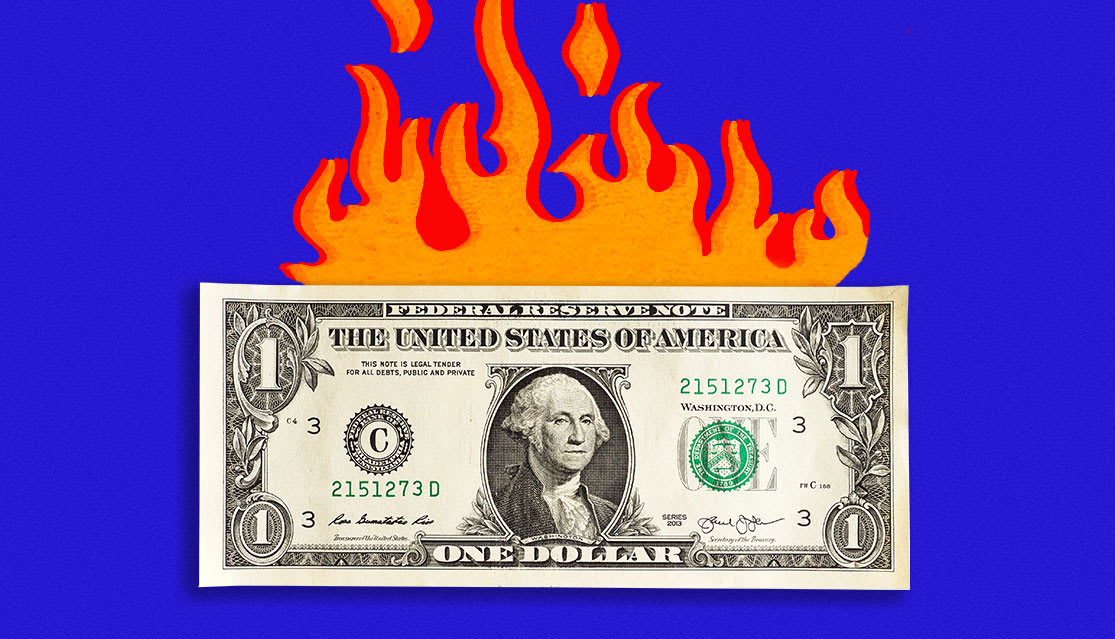Robert Hur defends special counsel report at tense House hearing on Biden documents probe
Washington — Former special counsel Robert Hur, who led the investigation into President Biden's handling of classified documents, testified Tuesday before the House Judiciary Committee, where lawmakers on both sides of the aisle have leveled heavy criticism against Hur's report that ultimately vindicated the president but included some highly critical conclusions.
In a tense hearing, Hur fielded frustrations from both Democrats and Republicans, who took issue with the former special counsel's report and accused him of acting in a partisan manner. Almost immediately it became clear that Hur had few allies in the room as lawmakers launched into a laundry list of often-conflicting critiques on Tuesday. Members of both parties invoked comparisons between Mr. Biden and former President Donald Trump.
"What I've observed in this hearing is that one side thinks you're trying to get Trump elected and the other side thinks you're trying to get President Biden elected," said Rep. Ken Buck, a Colorado Republican. "Welcome to Congress."
Republicans argued the decision not to recommend charges against Mr. Biden was evidence of a two-tiered justice system, given the charges that Trump faces for allegedly retaining classified material. Democrats countered that Republicans ignored the severity of the allegations against Trump, and compared Mr. Biden's decision to cooperate in Hur's probe with how Trump allegedly stonewalled repeated government efforts to retrieve sensitive documents. They also accused Hur of including gratuitous criticism of the president in his report.
Hur's report, released last month, found that no criminal charges were warranted in the Biden probe, but noted the inquiry uncovered evidence "that President Biden willfully retained and disclosed classified materials after his vice presidency." Hur ultimately concluded that the evidence did not establish the facts beyond a reasonable doubt.
The report also included damaging assertions about the 81-year-old president's memory that the White House has vehemently refuted. The transcript of Hur's interview with Mr. Biden last October, reviewed by CBS News, provides a fuller picture of the five-hour conversation between the two and context around some of the statements that appeared in the report. While the president did stumble over some dates and facts, he recalled many others clearly, frequently describing events or details from years ago.
The hearing on Hur's report
Hur is a former U.S. attorney and top Justice Department official in the Trump administration who was appointed special counsel in the case by Attorney General Merrick Garland. His employment with the Justice Department has ended since the report has been filed.
House Republicans, who lead the committee, highlighted what they claim is a double standard at the Justice Department after Trump was charged for allegedly mishandling classified documents. They also zeroed in on Mr. Biden's mental acuity.
"Joe Biden broke the law. But because he's a forgetful old man who would appear sympathetic to a jury, Mr. Hur chose not to bring charges," Rep. Jim Jordan, the Ohio Republican who leads the committee, said at the outset of the hearing.
Rep. Tom McClintock, a California Republican, said the decision crossed a "very bright line," calling it a "glaring double standard."
"The fact that the only person being prosecuted for this offense happens to be the president's political opponent makes this an unprecedented assault on our democracy," McClintock said.
Republicans seized on an exchange between Mr. Biden and the ghostwriter of his book. Investigators recovered a recording of Mr. Biden telling the ghostwriter in 2017 that he "just found all the classified stuff downstairs." But the president told Hur's team that he hadn't kept any documents that he knew were classified, and said he had no memory of the comments made to the ghostwriter. Hur said on Tuesday that Mr. Biden's comments are "inconsistent with the findings" in the report.
Meanwhile, Democrats came to the president's defense, while criticizing the former special counsel's characterization of Mr. Biden's memory. Rep. Jerrold Nadler of New York, the top Democrat, contrasted Mr. Biden's cooperation with the probe — along with his mental acuity — with Trump's.
"I believe, as is his habit, that President Biden probably committed a verbal slip or two during the interview. And I'm not sure any of that matters, because when the interview was over, Mr. Hur completely exonerated President Biden," Nadler said. "And then there is Donald Trump. What kind of man bungles not one, but dozens of opportunities to avoid criminal liability? What does that say about his mental state?"
Though Democrats affirmed the report's conclusions, some lambasted the former special counsel for what they saw as elevating GOP narratives.
"Despite clearing President Biden from being prosecuted, you used your report to trash and smear President Biden because he said in response to questions over a five-hour interview that he didn't recall how he got the documents," Rep. Hank Johnson, a Georgia Democrat, said. "And you know that that would play into the Republicans' narrative that the president is unfit for office because he's senile."
Rep. Adam Schiff, a California Democrat, accused Hur of making a "political choice."
"You were not born yesterday, you understood exactly what you were doing," Schiff added. "It was a choice."
Hur defended the investigation and report, saying "partisan politics had no place whatsoever in my work." He highlighted the probe's finding that Mr. Biden "willfully retained" classified materials, while noting that the investigation did not find evidence that "rose to the level of proof beyond a reasonable doubt." Because it fell short of that standard necessary to secure a conviction at trial, Hur explained that he declined to recommend criminal charges.
The former special counsel also outlined how he needed to explain in the report why he did not bring charges against Mr. Biden, including characterizations of the president's memory.
"I understood that my explanation about this case had to include rigorous, detailed and thorough analysis," Hur said in his opening remarks. "In other words, I needed to show my work, just as I would expect any prosecutor to show his or her work in explaining the decision to prosecute or not."
Hur said his assessment of how relevant Mr. Biden's memory was in the report was "necessary and accurate and fair."
"I did not sanitize my explanation, nor did I disparage the president unfairly," he said. "I explained to the attorney general my decision, and the reasons for it. That's what I was required to do."
Hur skillfully dodged numerous questions during the hours-long hearing, declining to stray beyond the contents of his report. While largely maintaining composure, he defended his report's conclusions, walking a fine line by standing by the determination that criminal charges were not necessary, while making clear that he did not "exonerate" Mr. Biden.
The Hur report
In a 345-page report, Hur detailed Mr. Biden's handling of classified documents that should have been sent to the National Archives but remained in his possession following his time as vice president. The report outlined how classified documents related to military and foreign policy in Afghanistan, along with notebooks with handwritten sensitive intelligence information, were found in various locations, including Mr. Biden's homes and offices.
Hur said Mr. Biden's conduct posed "serious risks to national security, given the vulnerability of extraordinarily sensitive information to loss or compromise to America's adversaries." But he also noted that "addressing those risks when pursuing criminal charges, the only means available to this office, is not the proper remedy here."
The special counsel concluded that the evidence "does not establish Mr. Biden's guilt beyond a reasonable doubt," suggesting that the documents may have been brought to the different locations by mistake.
The yearlong probe included more than 170 interviews of nearly 150 witnesses, including the president himself.
The focus on Biden's memory
Hur's report also featured a number of observations about Mr. Biden's memory that dominated headlines and became fodder for GOP opposition in the weeks that followed, as concern about the president's mental acuity and age surfaced during his reelection campaign.
The report alleged that the president's memory "appeared to have significant limitations," leading the special counsel's team to believe a jury might see Mr. Biden as a "well-meaning, elderly man with a poor memory." The report also claimed that Mr. Biden could not recall the year his son, Beau Biden, died and when he served as vice president, among other incidents.
Mr. Biden said in February about the report that he was "especially pleased to see the senior special counsel make clear there's stark differences between this case and Donald Trump." But Mr. Biden later said that "there's even a reference that I don't remember when my son died. How in the hell dare he raise that? Frankly, when I was asked the question, I thought to myself it wasn't any of their damn business."
The transcript of Mr. Biden's interview shows the president was unable to identify the precise year, but that he correctly named the month and date. "What month did Beau die? Oh God — May 30th," Mr. Biden said in the exchange.
The White House counsel's office asked the special counsel to revise some of the language in the report, while Biden allies called the descriptions "inflammatory." Bob Bauer, personal counsel to the president, told "Face the Nation" after the report's release that it "went off the rails," calling the report a "shoddy work product" and claiming that outside of the legal analysis, there were misstatements of fact and commentary that were "totally inappropriate."
House Republicans on the committee highlighted the memory-related elements of the report at the hearing on Tuesday, as Mr. Biden's opponents continue to cite the Hur report's characterization of the president's mental acuity.
Mr. Biden came under intense criticism after the report's release, as questions about his age as he seeks four more years in office abounded. But a spirited State of the Union address last week seemed to temper some concerns for now about his ability to do the job.





